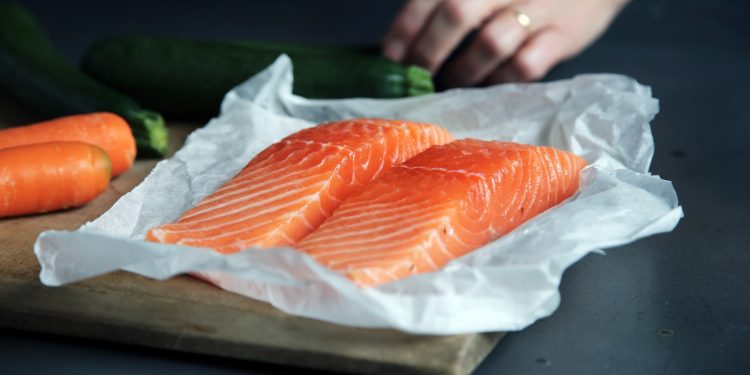Maintaining a sharp mind and a good memory is something we all strive for, especially as we age. Diet plays a crucial role in supporting brain health and improving cognitive function. Certain foods have been shown to enhance memory, concentration, and even reduce the risk of cognitive decline. By incorporating these brain-boosting foods into your diet, you can support overall mental well-being and keep your mind in top shape.
1. Fatty Fish
Fatty fish like salmon, mackerel, trout, and sardines are some of the best foods for brain health. These fish are rich in omega-3 fatty acids, which are essential for building and maintaining the structure of brain cells. About 60% of your brain is made of fat, and omega-3s play a key role in maintaining this healthy fat composition. Omega-3s are also known for their anti-inflammatory properties, which can help protect the brain from damage and aging.
Studies have shown that people who consume higher amounts of omega-3 fatty acids have better cognitive function, improved memory, and are less likely to develop Alzheimer’s disease. If you don’t eat fish, you can also get omega-3s from plant-based sources like chia seeds, flaxseeds, and walnuts.
2. Blueberries
Blueberries are often touted as a superfood, and for good reason. They are packed with antioxidants, particularly anthocyanins, which have been shown to reduce oxidative stress and inflammation—two factors that can negatively impact brain health. The antioxidants in blueberries help protect the brain from free radicals, which can cause cell damage over time.
Research suggests that eating blueberries can improve communication between brain cells, enhance memory, and even delay age-related cognitive decline. Adding a handful of blueberries to your breakfast cereal, yogurt, or smoothies is an easy way to boost your brain health.
3. Dark Chocolate
Dark chocolate, particularly those with a high cocoa content, is rich in flavonoids, caffeine, and antioxidants, all of which are beneficial for the brain. Flavonoids in dark chocolate are known to enhance memory and improve cognitive performance by increasing blood flow to the brain.
In addition to flavonoids, dark chocolate contains a small amount of caffeine, which can improve mood, concentration, and focus. Studies have found that consuming dark chocolate can improve brain plasticity—the ability to adapt and learn—which is vital for memory and cognitive function. Choose dark chocolate with at least 70% cocoa to get the maximum benefits without too much added sugar.
4. Turmeric
Turmeric is a spice that has been used for centuries for its medicinal properties. Its active ingredient, curcumin, has powerful anti-inflammatory and antioxidant effects, which are particularly beneficial for the brain. Curcumin has been shown to cross the blood-brain barrier, allowing it to directly affect the brain and improve its function.
Curcumin may help boost mood, improve memory, and reduce the risk of depression by increasing levels of brain-derived neurotrophic factor (BDNF), a type of growth hormone that helps create new neurons. You can add turmeric to curries, soups, or even golden milk for a daily dose of brain-boosting benefits.
5. Broccoli
Broccoli is a cruciferous vegetable that is loaded with antioxidants and vitamin K, which is essential for brain health. Vitamin K is involved in the formation of sphingolipids, a type of fat that is found in high concentrations in brain cells. Studies have shown that a diet rich in vitamin K can improve cognitive function and support overall brain health.
In addition to vitamin K, broccoli also contains compounds that have anti-inflammatory effects, which may help protect the brain from damage. Including broccoli in your diet, whether steamed, roasted, or added to salads, can help keep your mind sharp.
6. Pumpkin Seeds
Pumpkin seeds are a great snack for boosting brain health, as they are packed with antioxidants, magnesium, iron, zinc, and copper. These nutrients are vital for overall brain function, and their deficiency can lead to various cognitive problems.
Zinc is particularly important for nerve signaling, while magnesium helps with learning and memory. Iron deficiency is often linked to impaired cognitive function, and copper is essential for controlling nerve signals. Snacking on pumpkin seeds or adding them to smoothies and salads can provide these essential nutrients that support brain health.
7. Oranges
Oranges are well-known for their vitamin C content, but what many people don’t realize is that vitamin C is a powerful antioxidant that plays an important role in brain health. Vitamin C helps protect the brain from oxidative stress, which can lead to cognitive decline and memory loss.
Research has also shown that vitamin C can help protect against age-related cognitive decline and support overall brain function. Eating one orange a day provides all the vitamin C you need to maintain optimal brain health. Other good sources of vitamin C include bell peppers, strawberries, and kiwi.
8. Nuts
Nuts, especially walnuts, are rich in nutrients that are beneficial for the brain. Walnuts, in particular, contain high levels of DHA, a type of omega-3 fatty acid that has been linked to improved cognitive performance and memory. Other nuts, like almonds and hazelnuts, also provide healthy fats, vitamin E, and antioxidants, all of which contribute to brain health.
Vitamin E is an important antioxidant that helps protect the brain from oxidative stress and age-related decline. Including a small handful of nuts in your daily diet can have significant benefits for memory and cognitive function.
9. Green Tea
Green tea is known for its many health benefits, but it also has specific properties that benefit the brain. Green tea contains caffeine, which can improve alertness, focus, and concentration. In addition to caffeine, green tea also contains L-theanine, an amino acid that can help reduce anxiety and promote relaxation without causing drowsiness.
L-theanine and caffeine work together to improve brain function and enhance cognitive performance. Green tea is also rich in antioxidants, which help protect the brain from oxidative stress and reduce the risk of cognitive decline. Drinking a cup of green tea daily can be a great way to boost brain health naturally.
10. Eggs
Eggs are an excellent source of several nutrients that are essential for brain health, including vitamins B6 and B12, folate, and choline. Choline, in particular, is an important nutrient for the production of acetylcholine, a neurotransmitter that helps regulate mood and memory. Unfortunately, many people do not get enough choline in their diet, making eggs an easy and nutritious way to increase intake.
Vitamin B12 and folate are also important for brain health, as they help reduce levels of homocysteine, an amino acid that has been linked to cognitive decline. Eating eggs for breakfast or incorporating them into meals throughout the week can support memory and cognitive function.
Incorporating Brain-Boosting Foods Into Your Diet
Incorporating these brain-boosting foods into your diet doesn’t have to be complicated. Start by adding a serving of fatty fish to your weekly meal plan or tossing some blueberries into your morning smoothie. Add a sprinkle of turmeric to soups and curries, snack on a handful of nuts or pumpkin seeds, and swap sugary snacks for dark chocolate with high cocoa content. Making small, simple changes to your daily diet can have a big impact on your cognitive health.
Maintaining brain health is about more than just food—it also involves staying physically active, getting enough sleep, managing stress, and engaging in activities that challenge the brain. However, eating a nutrient-rich diet that includes these foods is one of the best ways to support cognitive function and keep your memory sharp as you age. By making mindful choices and prioritizing these brain-boosting foods, you can enjoy a healthier mind and a sharper memory for years to come.















Discussion about this post